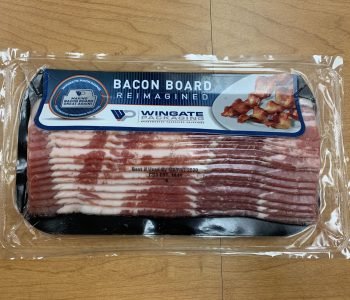MuCell®, an industry first in recyclable food packaging
MuCell Extrusion technology offers the potential to reduce the plastic content of consumer packaging by around 15%, by injecting inert gas to displace plastic with microcellular bubbles.
For more than 50 years, Ohio-based SugarCreek has been manufacturing and packing food for the USA’s largest and best-known brands, offering a wide-ranging, value-added assortment of raw and fully cooked products for domestic and international customers from its six facilities.
SugarCreek packs bacon for much of the North American market, until recently using a coated paper incorporating food contact on one surface and high-quality print on the other, known as bacon board. However, this is non-recyclable, generating 14% waste at the printing/cutting station and 100% landfill or incineration after use. SugarCreek and others had therefore long sought an alternative material with no cost penalty.
What we did
In 2018, SugarCreek’s Wingate division, which prints the bacon board on narrow web flexo presses, engaged with MuCell Extrusion, resulting in a blown plastic material with a foamed core that matches all the properties of the previous coated paper at a lower cost. This can be made of over 95% high-density polyethylene (HDPE) foam, making it fully recyclable via post-consumer waste streams. It can even be recycled back into the core of the same product.
A Life Cycle Assessment showed a reduction in carbon footprint of 28%, a reduction in freshwater consumption of 79%, and an improvement of 22% in ReCiPe score (total impact on human health, on the ecosystem and on consumption of available resources.)

Results
The MuCell Extrusion solution meets or exceeds all performance requirements, including stiffness, coefficient of friction, surface smoothness, high-definition print, ease of processing and conversion, and food safety regulations. This successful partnership was the genesis of ReZorce®, our range of fully recyclable barrier packaging materials launched in October 2019.